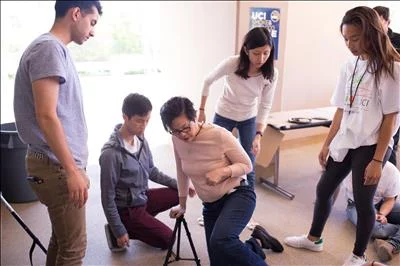Hack Haven

In a lab space in the Henry Samueli School of Engineering on the University of California, Irvine’s campus, a group of Jewish and non-Jewish students stand arrayed in a semi-circle watching as Kelly Lai attempts to zip up her jacket with a prototype device they’ve created.
Lai suffered a stroke which severely restricts the use of her right arm, making mundane daily tasks like zipping her clothes Herculean.
The device doesn’t work.
Lai apologizes, professing that she needs to practice more with the invention, but the students participating in this campus hackathon protest. “No, no, no, we need to design it for you better!”
Exhausted yet exhilarated, the students agree to keep tinkering – with no breaks – until they get it right. The clock in the lab reads 4:00 a.m. before they call it quits for the night.
After several more trials, the device started working on the third and final day of the hackathon.
In the past two years, Hillels across the country have increasingly taken part in and hosted hackathons like this one. Fueled by pizza, snacks and energy drinks, students sequester themselves in campus labs for up to 72 hours in order to brainstorm, build and refine new inventions.
The Hillel hackathon trend is taking shape in different forms across the country–from accommodating shomer Shabbos students, to a focus on tikkun olam to disability inclusion.
For Elisa Tran, University of California Irvine ‘19, participating in UC Irvine’s recent disability inclusion hackathon was not only academic, but personal. Lai, the woman for whom the zipper aid was developed, is her mother.
Tran was one of eight non-Jewish participants who traveled on a fact-finding mission to Israel last summer through the Hillel Foundation of Orange County, where she met the director of Tikkun Olam Makers (TOM). TOM, an initiative of the Reut Institute, is a global movement that connects communities of makers, designers, developers and engineers to ‘need knowers,’ or people with a disability, to develop technological solutions for their everyday struggles.
Tran instantly knew she wanted to bring a TOM hackathon back to campus, so she asked Lisa Armony, executive director of the Hillel Foundation of Orange County, to have Hillel co-sponsor an event. Armony jumped at the chance.
“Students told me that they do not often get an opportunity to create something that addresses a real need of someone, especially someone in their own community,” Armony said in a recent interview. “They enjoyed working with their need knowers, getting to know them, getting a deep understanding of the need, and then creating a product tailor-made to the individual.”
When Harvard Hillel hosted its own hackathon that was co-sponsored by Harvard TAMID and TAVtech last year, “H3,” students pitched product prototypes to technologists, entrepreneurs and venture capitalists through a Jewish lens. The scope was purposely left open-ended as lo🇱️ng as the hacks served a societal good.
Ben Pleat, Harvard College ‘17, said the projects are either for commercial or social use, but Judaism was a central aspect of each project, because the products functions were required to be in the realm of bettering the world.
Fueled by pizza and Red Bull, participants collaborated on prototype inventions for applications as diverse as improving healthcare to relieving homelessness. One invention even connected restaurants with homeless shelters in need of food donations.
“With the right tools and the right moral framework, we can and should make the world better around us,” Pleat said.
University of Maryland Hillel was among the first Hillels to host a hackathon back in 2015. The event was run by a student group called JHacks and was Shabbat-friendly, drawing students from Hillels all over the country. The Times of Israel sent its technology editor, David Shamah, all the way from Israel to cover it.
Avi Passy, University of Maryland ’20, co-vice president of operations for JHacks, said the club works to ensure that anyone who wants to participate in the event doesn’t have to compromise their religious beliefs. The hackathon, now an annual event, starts after Shabbat ends, offers kosher food and helps find shomer Shabbos students a space to observe Shabbat before the event begins.
Regardless of the approach Hillel hackathons take, each one has served as a new way to engage students.
“This program enabled us to reach students we would not otherwise have met because what motivated them to participate was their passion for engineering and the excitement of doing something to help someone else,” Armony said. “Once they were part of the initiative, we could build relationships, have meaningful conversations, and explore issues together.”
–Paige Gutter